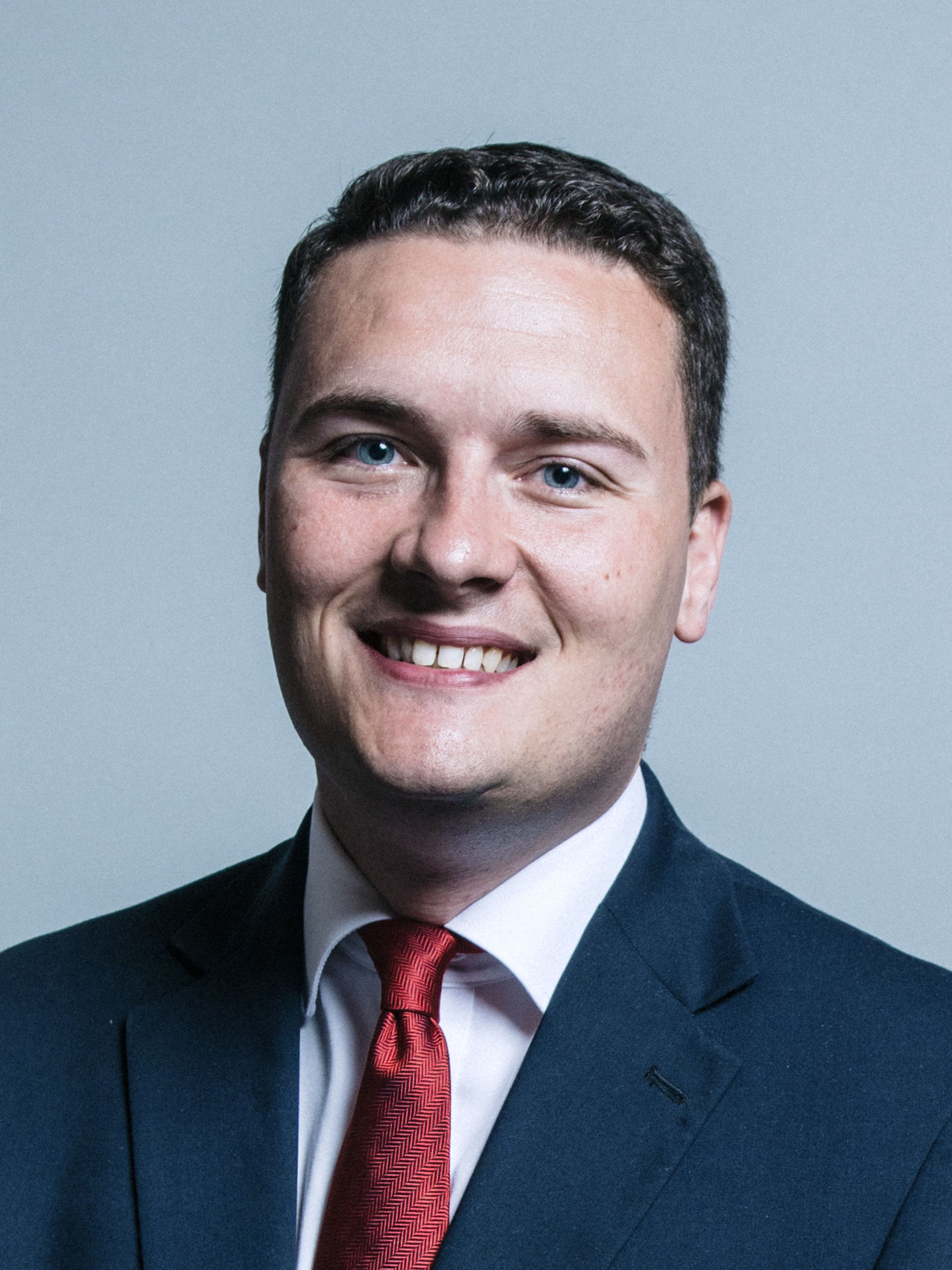Department of Health and Social Care
We support ministers in leading the nation’s health and social care to help people live more independent, healthier lives for longer.
Shadow Ministers / Spokeperson
Liberal Democrat
Helen Morgan (LD - North Shropshire)Liberal Democrat Spokesperson (Health and Social Care)
Danny Chambers (LD - Winchester)
Liberal Democrat Spokesperson (Mental Health)
Lord Scriven (LD - Life peer)
Liberal Democrat Lords Spokesperson (Health)
Scottish National Party
Seamus Logan (SNP - Aberdeenshire North and Moray East)Shadow SNP Spokesperson (Health and Social Care)
Green Party
Adrian Ramsay (Green - Waveney Valley)Green Spokesperson (Health)
Conservative
Stuart Andrew (Con - Daventry)Shadow Secretary of State for Health and Social Care
Junior Shadow Ministers / Deputy Spokesperson
Conservative
Lord Kamall (Con - Life peer)Shadow Minister (Health and Social Care)
Caroline Johnson (Con - Sleaford and North Hykeham)
Shadow Minister (Health and Social Care)
Junior Shadow Ministers / Deputy Spokesperson
Conservative
Luke Evans (Con - Hinckley and Bosworth)Shadow Parliamentary Under Secretary (Health and Social Care)
Ministers of State
Stephen Kinnock (Lab - Aberafan Maesteg)Minister of State (Department of Health and Social Care)
Karin Smyth (Lab - Bristol South)
Minister of State (Department of Health and Social Care)
Parliamentary Under-Secretaries of State
Baroness Merron (Lab - Life peer)Parliamentary Under-Secretary (Department of Health and Social Care)
Ashley Dalton (Lab - West Lancashire)
Parliamentary Under-Secretary (Department of Health and Social Care)
Zubir Ahmed (Lab - Glasgow South West)
Parliamentary Under-Secretary (Department of Health and Social Care)
16:00
Correspondence
The Committee is holding an inquiry into what is needed from the NHS estate to deliver the Government’s vision of …
To ask the Secretary of State for Health and Social Care, what steps he is taking to improve 24-hour Urgent …
These Regulations amend the Health and Social Care Act 2008 (Regulated Activities) Regulations 2014 (“the 2014 Regulations”).
A Bill to Make provision about the prioritisation of graduates from medical schools in the United Kingdom and certain other …
00:15
News and Communications
Department of Health and Social Care Commons Appearances
Oral Answers to Questions is a regularly scheduled appearance where the Secretary of State and junior minister will answer at the Dispatch Box questions from backbench MPs
Other Commons Chamber appearances can be:- Urgent Questions where the Speaker has selected a question to which a Minister must reply that day
- Adjornment Debates a 30 minute debate attended by a Minister that concludes the day in Parliament.
- Oral Statements informing the Commons of a significant development, where backbench MP's can then question the Minister making the statement.
Westminster Hall debates are performed in response to backbench MPs or e-petitions asking for a Minister to address a detailed issue
Written Statements are made when a current event is not sufficiently significant to require an Oral Statement, but the House is required to be informed.
Most Recent Commons Appearances by Category
Bills currently before Parliament
Department of Health and Social Care does not have Bills currently before Parliament
Acts of Parliament created in the 2024 Parliament
A Bill to make provision to amend the Mental Health Act 1983 in relation to mentally disordered persons; and for connected purposes.
This Bill received Royal Assent on 18th December 2025 and was enacted into law.
Department of Health and Social Care - Secondary Legislation
Petitions
e-Petitions are administered by Parliament and allow members of the public to express support for a particular issue.
If an e-petition reaches 10,000 signatures the Government will issue a written response.
If an e-petition reaches 100,000 signatures the petition becomes eligible for a Parliamentary debate (usually Monday 4.30pm in Westminster Hall).
(16,519 in the last 7 days)
(4,664 in the last 7 days)
(3,191 in the last 7 days)
(2,707 in the last 7 days)
(1,918 in the last 7 days)
(167 in the last 7 days)
(908 in the last 7 days)
(269 in the last 7 days)
(391 in the last 7 days)
(16,519 in the last 7 days)
Petition Closed
Increase funding for people with Parkinson’s and implement the "Parky Charter"
Gov Responded - 29 Apr 2025closed 5 months, 3 weeks ago
We want the government to take the decisive five steps set out in the Movers and Shakers' "Parky Charter" and to fulfil the Health Secretary’s promises.
Departmental Select Committee
Health and Social Care Committee
Commons Select Committees are a formally established cross-party group of backbench MPs tasked with holding a Government department to account.
At any time there will be number of ongoing investigations into the work of the Department, or issues which fall within the oversight of the Department. Witnesses can be summoned from within the Government and outside to assist in these inquiries.
Select Committee findings are reported to the Commons, printed, and published on the Parliament website. The government then usually has 60 days to reply to the committee's recommendations.
11 Members of the Health and Social Care Committee

Health and Social Care Committee Member since 9th September 2024

Health and Social Care Committee Member since 21st October 2024

Health and Social Care Committee Member since 21st October 2024

Health and Social Care Committee Member since 21st October 2024

Health and Social Care Committee Member since 21st October 2024

Health and Social Care Committee Member since 21st October 2024

Health and Social Care Committee Member since 21st October 2024

Health and Social Care Committee Member since 21st October 2024

Health and Social Care Committee Member since 21st October 2024

Health and Social Care Committee Member since 28th October 2024

Health and Social Care Committee Member since 17th March 2025
Health and Social Care Committee: Upcoming Events
4 Mar 2026, 9 a.m.
View calendar - Save to Calendar
Health and Social Care Committee: 9 Current Inquiries
Health and Social Care Committee: Previous Inquiries
50 most recent Written Questions
(View all written questions)Integrated care board (ICBs) are responsible for commissioning primary care services, including National Health Service dentistry, to meet the needs of the local population. For the Slough constituency, this is the Frimley ICB.
The Government is committed to ensuring people can access urgent dental care when they need it. Over the past year, ICBs have been commissioning additional urgent dental appointments and there is now an urgent care safety net available in all areas of the country. We are broadening the scope of the commitment to deliver additional appointments so that they can be used for more patients, not just those who meet the clinical criteria for “urgent” care.
We are committed to delivering fundamental reform of the dental contract before the end of this Parliament. As a first step, on 16 December we published the Government’s response to the public consultation on quality and payment reforms to the NHS dental contract. The changes will be introduced from April 2026. These reforms will put patients with greatest need first, incentivising urgent care and complex treatments. Further information is available at the following website:
Minister of State (Department of Health and Social Care)
We recognise the challenges in accessing general practices (GPs). That’s why we are expanding capacity across England, including in Slough. Since October 2024, we have invested £160 million into the Additional Roles Reimbursement Scheme to support recruitment of over 2,000 GPs, exceeding our initial target of 1,000. Changes in the 2025/26 contract have also removed restrictions so individual primary care networks can hire more GPs.
We are also introducing a practice‑level GP reimbursement scheme, worth £292 million, enabling practices to hire additional GPs or fund extra GP sessions. This will improve access, boost capacity, and support GP employment.
Slough sits within the NHS Frimley Integrated Care Board, where the number of appointments delivered in GPs has increased by 6.7%, rising from 358,000 in December 2024 to 382,000 in December 2025.
Minister of State (Department of Health and Social Care)
There are currently no dental schools in Nottingham, Nottinghamshire, or the East Midlands. Consequently, no dental students have undertaken undergraduate training in Nottingham, Nottinghamshire, or the East Midlands. The following table shows the number of entrants to undergraduate dentistry courses in England from 2012 to 2025:
Year of Entry | Entrants |
2012 | 875 |
2013 | 875 |
2014 | 800 |
2015 | 780 |
2016 | 800 |
2017 | 805 |
2018 | 810 |
2019 | 810 |
2020 | 895 |
2021 | 980 |
2022 | 815 |
2023 | 815 |
2024 | 830 |
2025 | 815 |
Source: Office for Students Medical and Dental Students Survey.
Note: data for 2025 is provisional as entrants are based on initial figures and may change.
Minister of State (Department of Health and Social Care)
The Government is committed to ensuring that people approaching the end of life receive high-quality, compassionate care whenever it is needed.
Urgent community response (UCR) services play a key role in this. UCR provides a two-hour community-based response to adults experiencing a sudden deterioration in their health and helps avoid unnecessary hospital admissions. People at the end of life are among those who can be referred into UCR services for urgent crisis, for symptom control and/or pain relief, in line with a person’s wishes.
We are committed to improving the consistency, capacity, and availability of UCR services across England. The Urgent and Emergency Care Delivery Plan 2025/26 includes actions to expand urgent care delivered in the community, including UCR, and the National Health Service 10-Year Health Plan further commits to increasing access to urgent care at home and in the community as part of the new Neighbourhood Health model.
Additionally, NHS England’s published statutory guidance on palliative care and end-of-life care states that integrated care boards, as commissioning authorities, must define how their local service providers meet population needs on a 24/7 basis.
The National Institute for Health and Care Excellence (NICE) guideline, NG142: End of life care for adults: service delivery, also recommends that adults nearing the end of life have access to a healthcare professional 24 hours a day, seven days a week, as well as an out-of-hours advice line and access to essential medicines for symptom management.
Although NICE guidance is not mandatory, there is an expectation that commissioners and service providers take the guidelines into account when making decisions about how to best meet the needs of their local communities.
Furthermore, to strengthen provision for people at the end of life, we will publish a Palliative Care and End-of-Life Care Modern Service Framework (MSF) later this year. Through our MSF, we will closely monitor the shift towards the strategic commissioning of palliative care and end-of-life care services to ensure that services reduce variation in access and quality, including strengthening out-of-hours community health support, dedicated telephone advice, and overall consideration of 24/7 provision.
Minister of State (Department of Health and Social Care)
The Government is committed to ensuring that people approaching the end of life receive high-quality, compassionate care whenever it is needed.
Urgent community response (UCR) services play a key role in this. UCR provides a two-hour community-based response to adults experiencing a sudden deterioration in their health and helps avoid unnecessary hospital admissions. People at the end of life are among those who can be referred into UCR services for urgent crisis, for symptom control and/or pain relief, in line with a person’s wishes.
We are committed to improving the consistency, capacity, and availability of UCR services across England. The Urgent and Emergency Care Delivery Plan 2025/26 includes actions to expand urgent care delivered in the community, including UCR, and the National Health Service 10-Year Health Plan further commits to increasing access to urgent care at home and in the community as part of the new Neighbourhood Health model.
Additionally, NHS England’s published statutory guidance on palliative care and end-of-life care states that integrated care boards, as commissioning authorities, must define how their local service providers meet population needs on a 24/7 basis.
The National Institute for Health and Care Excellence (NICE) guideline, NG142: End of life care for adults: service delivery, also recommends that adults nearing the end of life have access to a healthcare professional 24 hours a day, seven days a week, as well as an out-of-hours advice line and access to essential medicines for symptom management.
Although NICE guidance is not mandatory, there is an expectation that commissioners and service providers take the guidelines into account when making decisions about how to best meet the needs of their local communities.
Furthermore, to strengthen provision for people at the end of life, we will publish a Palliative Care and End-of-Life Care Modern Service Framework (MSF) later this year. Through our MSF, we will closely monitor the shift towards the strategic commissioning of palliative care and end-of-life care services to ensure that services reduce variation in access and quality, including strengthening out-of-hours community health support, dedicated telephone advice, and overall consideration of 24/7 provision.
Minister of State (Department of Health and Social Care)
Joshua Reynolds
(Liberal Democrat - Maidenhead)
The Department and its executive agencies currently employ three people at director-level with responsibility for human resources (HR).
All three hold professional HR qualifications from the Chartered Institute of Personnel and Development.
Minister of State (Department of Health and Social Care)
The call for evidence only collects personal category data that is necessary to support its analysis and further our understanding of the experiences of different groups of women and families, in line with United Kingdom data protection proportionality principles. Individuals’ names or other identifiable information are not collected because they were not deemed necessary for analysis.
Surveys are hosted by SurveyOptic, who are monitoring their network for unusual spikes in activity and will flag anything unusual to the investigation team to prevent bots. Throughout the analysis process, responses that appear to be duplicative, whether identical or near identical, will be removed.
Minister of State (Department of Health and Social Care)
The 10 Year Health Plan is clear that the National Health Service needs to modernise and shift toward providing continuous, accessible and integrated care. This relies on clear communication across different services, including primary and secondary care. The Plan set out our commitment to delivering the recommendations of the ‘Red Tape Challenge’, which includes making improvements at the interface between primary and secondary care. This contains measures such as improving access to shared care records and greater standardisation of forms and processes across services.
The Elective Reform Plan, published in January 2025, set out the need for more integrated working between primary and secondary care. As part of the approach, the Government expanded the Advice and Guidance (A&G) scheme in 2025/26 with £80 million of funding allocated for General Practice to increase uptake. Between April 2025 and October 2025, there has been an increase of 22% in processed A&G requests compared to the same period last year. A&G facilitates communication between General Practice and specialists to ensure care is delivered in the most appropriate place.
The NHS Medium Term Planning Framework, published in October 2025, also set out an improved approach to triaging patients. From April 2026, the NHS will start moving toward a unified access model where all appropriate requests and referrals (excluding urgent suspect cancer) will flow through a Single Point of Access, acting as a single ‘front door’ to support clinical triage to the most appropriate service or outcome. This will enable primary care referrers to get a response from specialists at the start of a patient’s care journey in secondary care, as well as timelier and more joined up care for patients.
Minister of State (Department of Health and Social Care)
Mileage rates for Agenda for Change staff and resident doctors in England are set out in the NHS Terms and Conditions of Service (TCS) Handbook, also known as the Agenda for Change handbook. The TCS is maintained by the NHS Staff Council. Mileage reimbursement rates in England are reviewed twice a year in April and November.
The outcome of the last review in November 2025 resulted in reimbursement rates reducing due to sustained decreases in fuel prices for the 12-month period ending in October 2025. Reimbursement rates dropped to 56 pence per mile for the first 3,500 miles claimed before dropping to 21 pence per mile thereafter. The revised rates apply to mileage incurred from 1 January 2026 onwards.
Minister of State (Department of Health and Social Care)
The Government is aware of the impact that waiting for diagnostic tests, like colonoscopies, has on patients and is committed to reducing waiting times through transforming diagnostic services in acute hospitals and community diagnostic centres (CDCs). Earlier access to diagnostic tests is key to supporting earlier diagnosis and earlier treatment if needed.
A colonoscopy is a type of an endoscopic procedure. The strategy for endoscopy across Sussex is for new treatments, such as cyto-sponge and colon capsule endoscopy, to be developed and delivered through its CDCs in 2026/27, offering less invasive alternatives to endoscopy for the many patients for whom they are suitable. This will reduce the demand on endoscopy services in hospitals which will be able to be more effectively used for those patients who require them.
We are pleased to say that a new endoscopy centre on the Eastbourne Hospital site is due to start taking patients in March 2026, which will further improve the capacity and environment for patients.
Minister of State (Department of Health and Social Care)
We set out in the 10-Year Health Plan for England that over the next three years we will create 1,000 new specialty training posts, with a focus on specialties where there is greatest need. We will set out next steps in due course.
This Government is committed to training the staff we need, including doctors, to ensure patients are cared for by the right professional, when and where they need it. We will publish a 10 Year Workforce Plan to set out action to create a workforce ready to deliver the transformed services set out in the 10-Year Health Plan.
Minister of State (Department of Health and Social Care)
Non-Emergency Patient Transport Schemes (NEPTS) often provide funded transport where a medical condition means that a patient would struggle to safely attend their treatment independently. NEPTS can be provided by ambulance trusts or other providers depending on local arrangements.
In 2019, NHS England set out updated eligibility criteria, which includes disability criteria, which is available at the following link:
https://www.england.nhs.uk/wp-content/uploads/2022/05/B1244-nepts-eligibility-criteria.pdf
We want disabled people’s access to, and experience of, healthcare services to be equitable, effective and responsive to their needs.
NEPTS in England is an operational matter for the National Health Service and how the NEPTS guidance is implemented at a local level is determined by integrated care boards and their partners, including local ambulance trusts.
Minister of State (Department of Health and Social Care)
We are committed to transforming diagnostic services and will support the National Health Service to increase diagnostic capacity to bring down the size of the list and reduce waiting times, including investment in new magnetic resonance imaging (MRI) and computed tomography (CT) scanners. Speeding up waiting times for diagnostic tests is a crucial part of reducing overall waiting times and returning to the referral to treatment 18-week standard.
The 2025 Spending Review confirmed over £6 billion of additional capital investment over five years across new diagnostic, elective, and urgent care capacity. This includes £600 million in capital funding for diagnostics in 2025/26 to support delivery of the NHS performance standards. This funding will deliver new community diagnostic centres, including new MRI and CT scanners, new scanners in acute hospital settings, as well as replacements of the oldest CT and MRI scanners. Further details and allocations will be set out in due course.
The Health Innovation Network (HIN) fosters partnerships with industry and the NHS to accelerate the evaluation, adoption, and spread of health innovations, including diagnostics. This is why the Government’s 10-Year Health Plan and the Life Sciences Sector Plan make explicit commitments to continue funding and empowering the HIN.
Minister of State (Department of Health and Social Care)
The following table shows the number of National Health Service employed doctors, and self-employed general practitioners (GPs) who are members of the NHS pension plan, who retired in 2022, 2023, or 2024, and who were aged 60 years old and younger, 61 to 67 years old, or 68 years old and over:
Year | Job | 60 years old and younger | 61 to 67 years old | 68 years old and over |
2022 | Doctor | 2,697 | 962 | 129 |
2022 | GP | 1,113 | 216 | 14 |
2023 | Doctor | 2,970 | 1,155 | 134 |
2023 | GP | 1,244 | 228 | 11 |
2024 | Doctor | 2,962 | 1,227 | 161 |
2024 | GP | 1,189 | 202 | 13 |
The data is unpublished and is provided by the NHS Business Services Authority which administers the NHS Pension Scheme. Normal pension ages vary across the NHS Pension Schemes. In the 1995 section of the legacy scheme, the normal pension age is 60 years old, and in the 2008 section of that scheme, it is 65 years old. In both these sections, actuarially reduced benefits can be taken from 55 years old, or 50 years old in some cases. In the 2015 scheme, the normal pension age is 65 years old or State Pension age, whichever is later, and reduced benefits can be accessed from 55 years old.
Parliamentary Under-Secretary (Department of Health and Social Care)
There are no current plans to appoint a Maternity Commissioner. The Government has commissioned an independent National Investigation into maternity and neonatal care, chaired by Baroness Amos, which is expected to make recommendations this spring. My Rt Hon. Friend, the Secretary of State for Health and Social Care, will chair the National Maternity and Neonatal Taskforce to address the recommendations and develop a new national action plan to drive improvements across maternity and neonatal care.
Minister of State (Department of Health and Social Care)
Bobby Dean
(Liberal Democrat - Carshalton and Wallington)
We can confirm that we will follow Transfer of Undertakings Protection of Employment (TUPE) like principles, whether TUPE or another statutory transfer mechanism, in line with the Cabinet Office Statement of Practice. This means that recognised trade unions will be formally consulted and engaged on measures related to the transfer with no changes to contractual terms and conditions made without proper consultation and engagement.
Minister of State (Department of Health and Social Care)
We are committed to improving the diagnosis, treatment, and ongoing care for gynaecological conditions including endometriosis, and we are taking action to address this, including delivering 5.2 million extra appointments between July 2024 and June 2025 across all specialities including gynaecology.
In September 2025, we announced an “online hospital”, via NHS Online, which will give people the choice of getting the specialist care they need from their home. NHS Online will help to reduce patient waiting times, delivering the equivalent of up to 8.5 million appointments and assessments in its first three years, four times more than an average trust, while enhancing patient choice and control over their care. Menstrual problems which may be a sign of endometriosis will be among the first conditions available for referral to NHS Online from 2027.
In November 2024, the National Institute for Health and Care Excellence (NICE) updated its guideline on endometriosis. This makes firmer recommendations for healthcare professionals on referral and investigations for women with suspected diagnosis and will help the estimated one in 10 women with endometriosis receive a diagnosis faster.
Additionally, research has led to new treatments being made available, including the NICE approval of two pills to treat endometriosis this year, Relugolix and Linzagolix. Both are estimated to help approximately 1,000 women with severe endometriosis for whom other treatment options haven’t been effective. NICE is working with National Health Service systems to ensure adoption of this best practice of endometriosis care, including access to approved medicines.
NHS England is updating the service specification for severe endometriosis which will be published in due course. This will improve the standards of care for women with severe endometriosis by ensuring specialist services have access to the most up-to-date evidence and advice.
The Department, through the National Institute for Health and Care Research (NIHR), has commissioned a number of studies focused on endometriosis diagnosis, treatment and patient experience. At present, the NIHR is funding seven active research awards totalling an investment of approximately £7.8 million. This includes a new £2.3 million award on the effectiveness of pain management for endometriosis starting in March 2026.
Minister of State (Department of Health and Social Care)
It is unacceptable that women can wait so long for an endometriosis diagnosis, and we are committed to improving the diagnosis, treatment, and ongoing care for endometriosis.
As announced in September 2025, we will establish an “online hospital”, via NHS Online, which will give people across the country, including in Slough and the South East, on certain pathways the choice of getting the specialist care they need from their home. It will connect patients with clinicians across the country through secure, online appointments accessed through the NHS App.
In January 2026 we announced the nine conditions that NHS Online will initially focus on. Menstrual problems which may be a sign of endometriosis will be among the conditions available for referral to NHS Online from 2027. We’ve chosen some of the conditions with the longest waits and where online consultation works best.
NHS Online will help to reduce patient waiting times, delivering the equivalent of up to 8.5 million appointments and assessments in its first three years, four times more than an average trust, while enhancing patient choice and control over their care. This will allow women with menstrual problems which may be a sign of endometriosis across the country to reach a diagnosis sooner.
In November 2024 the National Institute for Health and Care Excellence (NICE) updated their guideline on endometriosis, which makes firmer recommendations for healthcare professionals on referral and investigations for women with suspected diagnosis, and which will help the estimated one in 10 women with endometriosis receive a diagnosis faster. NICE is working with NHS to ensure adoption of this best practice endometriosis care.
Minister of State (Department of Health and Social Care)
Whilst there may be mental health benefits associated with living in rural areas, such as through increased access to green space, living in rural areas may also present risks to mental health. For example, some people living in rural areas may have reduced access to services or experience loneliness and isolation. Latest data show that 22.6% of people have a common mental health condition in England and regional disparities are evident, as 20.6% of people in the North West had a common mental health condition compared to 24.6% in the North East and 16.3% in the South East.
The Farmer Welfare Grant supports projects improving the mental health and wellbeing of farming people in England. The projects aim to support farmers and their families by offering essential services such as online resources, workshops, training, networking, and one-to-one help.
We are making it easier than ever to access mental health support through the NHS App and expanding access to NHS Talking Therapies. This will benefit people living in rural areas who may be far from a physical service provider. We’re expanding Mental Health Support Teams in schools and colleges to reach full national coverage by 2029. This means all pupils will have access to mental health support in England. We are also opening new 24/7 Mental Health Centres around the country, backed by £473 million of capital funding for local systems.
Minister of State (Department of Health and Social Care)
The General Medical Council (GMC) is independent of the Government, is directly accountable to Parliament, and is responsible for operational matters concerning the discharge of its statutory duties. The Medical Practitioners Tribunal Service (MPTS) is a statutory committee of the GMC. The United Kingdom’s model of healthcare professional regulation is founded on the principle of regulators operating independently from the Government.
At the recent Health and Social Care Committee in January, questions were raised about the GMC’s fitness to practise procedures, particularly in relation to sexual misconduct cases. The GMC stated that sexual misconduct is unacceptable and that it had done a lot of work recently to tighten its guidance and expectations of registrants, setting out a new duty for them and adding a new duty for those who witness such behaviour. The GMC produces annual reports on its Fitness to Practise statistics. The GMC noted that the next report was due in July and committed to thinking about what it can publish in future with the aim to be as transparent as it can.
The Department takes cases concerning sexual assault and rape by healthcare professionals very seriously.
In line with the Ministerial Code, details of all ministerial meetings, including those with the GMC, are published quarterly on GOV.UK at the following link:
https://www.gov.uk/government/collections/ministerial-gifts-hospitality-overseas-travel-and-meetings
Minister of State (Department of Health and Social Care)
The General Medical Council (GMC) is independent of the Government, is directly accountable to Parliament, and is responsible for operational matters concerning the discharge of its statutory duties. The Medical Practitioners Tribunal Service (MPTS) is a statutory committee of the GMC. The United Kingdom’s model of healthcare professional regulation is founded on the principle of regulators operating independently from the Government.
At the recent Health and Social Care Committee in January, questions were raised about the GMC’s fitness to practise procedures, particularly in relation to sexual misconduct cases. The GMC stated that sexual misconduct is unacceptable and that it had done a lot of work recently to tighten its guidance and expectations of registrants, setting out a new duty for them and adding a new duty for those who witness such behaviour. The GMC produces annual reports on its Fitness to Practise statistics. The GMC noted that the next report was due in July and committed to thinking about what it can publish in future with the aim to be as transparent as it can.
The Department takes cases concerning sexual assault and rape by healthcare professionals very seriously.
In line with the Ministerial Code, details of all ministerial meetings, including those with the GMC, are published quarterly on GOV.UK at the following link:
https://www.gov.uk/government/collections/ministerial-gifts-hospitality-overseas-travel-and-meetings
Minister of State (Department of Health and Social Care)
This Government is committed to building a fairer Britain, to ensure people can live well for longer, and spend less time in ill health. Our reimagined National Health Service will tackle inequalities in both access and outcomes, as well as give everyone, no matter who they are or where they come from, the means to engage with the NHS on their own terms.
As per the 10-Year Health plan, bringing care from hospitals to communities, care and support will be shaped with local communities in mind. Women’s health hubs and neighbourhood delivery of care aim to address gaps in provision and long waiting times, specifically for those from low socio-economic background or those who are from minority ethnic backgrounds.
We are also renewing the Women’s Health Strategy, to assess the progress that has been made so far on women’s health, and to continue progressing delivery.
The renewed strategy will update on the delivery of the 2022 Women’s Health Strategy and set out how the Government is taking further steps to improve women’s health as we deliver the 10-Year Health Plan. It will also address gaps from the 2022 strategy and drive further change on enduring challenges such as creating a system that listens to women and tackling health inequalities, including through conditions such as endometriosis.
Minister of State (Department of Health and Social Care)
The Government is committed to prioritising women’s health as we reform the National Health Service, and women’s equality will be at the heart of our mission. We know that women deserve better, which is why we are delivering our commitment that women’s health will never be neglected again. Strong progress has already been made in turning the commitments in the 2022 Women's Health Strategy into tangible action.
The renewed strategy will update on the delivery of the 2022 Women’s Health Strategy and set out how the Government is taking further steps to improve women’s health as we deliver the 10-Year Health Plan. It will also address gaps from the 2022 strategy and drive further change on enduring challenges such as creating a system that listens to women, and that tackles health inequalities. We are currently considering evidence from experts to inform the contents of the renewed strategy.
Minister of State (Department of Health and Social Care)
NHS England does not hold this information centrally. Integrated care boards have contractual powers to manage activity by providers, which were enhanced in 2025/26 with central support for setting and managing activity. The NHS Standard Contract includes the ability to set indicative activity plans to help providers and commissioners plan demand, capacity, and expenditure. While not binding, if activity exceeds the agreed plan, and therefore the funding agreed, an activity management plan can be agreed to bring activity back in line.
Minister of State (Department of Health and Social Care)
The Government is clear that the professions protected in law must be the right ones and that the level of regulatory oversight must be proportionate to the risks to the public.
The Department has no current plans to extend statutory regulation to counsellors and psychotherapists, nor to introduce minimum standards of training and accountability required of individuals providing counselling and psychotherapy services. Any decisions about practice requirements are a matter for employers.
The Professional Standards Authority for Health and Social Care’s voluntary registers programme provides a proportionate means of assurance for unregulated professions, that sits between employer controls and statutory regulation by setting standards for organisations holding voluntary registers for unregulated health and social care occupations. There are currently 10 organisations that hold an accredited register linked to the counselling and psychotherapy professions on the Professional Standards Authority’s website.
Minister of State (Department of Health and Social Care)
The Government is clear that the professions protected in law must be the right ones and that the level of regulatory oversight must be proportionate to the risks to the public.
The Department has no current plans to extend statutory regulation to counsellors and psychotherapists, nor to introduce minimum standards of training and accountability required of individuals providing counselling and psychotherapy services. Any decisions about practice requirements are a matter for employers.
The Professional Standards Authority for Health and Social Care’s voluntary registers programme provides a proportionate means of assurance for unregulated professions, that sits between employer controls and statutory regulation by setting standards for organisations holding voluntary registers for unregulated health and social care occupations. There are currently 10 organisations that hold an accredited register linked to the counselling and psychotherapy professions on the Professional Standards Authority’s website.
Minister of State (Department of Health and Social Care)
The Government is clear that the professions protected in law must be the right ones and that the level of regulatory oversight must be proportionate to the risks to the public.
The Department has no current plans to extend statutory regulation to counsellors and psychotherapists, nor to introduce minimum standards of training and accountability required of individuals providing counselling and psychotherapy services. Any decisions about practice requirements are a matter for employers.
The Professional Standards Authority for Health and Social Care’s voluntary registers programme provides a proportionate means of assurance for unregulated professions, that sits between employer controls and statutory regulation by setting standards for organisations holding voluntary registers for unregulated health and social care occupations. There are currently 10 organisations that hold an accredited register linked to the counselling and psychotherapy professions on the Professional Standards Authority’s website.
Minister of State (Department of Health and Social Care)
The Government will consider long-term conditions for future waves of modern service frameworks (MSFs), including respiratory conditions. The criteria for determining other conditions for future MSFs will be based on where there is potential for rapid and significant improvements in quality of care and productivity. After the initial wave of MSFs is complete, the National Quality Board will determine the conditions to prioritise for new MSFs as part of its work programme.
Data is available for emergency finished admission episodes where there was a primary diagnosis of 'respiratory conditions’. Data for Tiverton and Minehead is shown in the table.
Activity in English NHS Hospitals and English NHS commissioned activity in the independent sector | ||
Westminster Parliamentary Constituency of Residence (Office for National Statistics) | 2024/25 (August 2024 to March 2025) | 2025/26 (April 2025 to November 2025, provisional) |
Tiverton and Minehead | 995 | 790 |
England | 608,449 | 423,588 |
Source: Hospital Episode Statistics, NHS England |
| |
Available data on trends in respiratory conditions can be found on the Department of Health and Social Care Fingertips website. Data is not available by parliamentary constituency, but is available at regional, county, unitary authority and integrated care board level. Information for Somerset is available at the following link:
The Government has committed to delivering three big shifts that our National Health Service needs to be fit for the future: from hospital to community; from analogue to digital; and from sickness to prevention. All of these are relevant to improving respiratory health in all parts of the country.
Through our community diagnostic centres (CDCs), we are building capacity for respiratory testing and enabling people to get diagnosed closer to home. 101 CDCs across the country now offer out-of-hours services, 12 hours a day, seven days a week, meaning patients can access vital diagnostic tests around busy working lives. This is alongside action being taken to expand capacity and improve the quality of pulmonary rehabilitation services to support patients living with respiratory conditions.
Minister of State (Department of Health and Social Care)
Jim Shannon
(Democratic Unionist Party - Strangford)
All health and social care providers have statutory obligations, set out in the Health and Social Care Act 2008: code of practice on the prevention and control of infections, to undertake steps to keep patients, residents, and staff safe. Ensuring patient and public safety in all areas where healthcare is provided is a priority, and infection prevention and control (IPC) is a core component of safe, high-quality care, regardless of care setting. More information about these obligations is available at the following link:
The National infection prevention and control manual for England contains guidance on Standard Infection Control Precautions, which are to be used by all staff, in all care settings, at all times, for all patients whether infection is known to be present or not. This manual is available at the following link:
https://www.england.nhs.uk/national-infection-prevention-and-control-manual-nipcm-for-england/
Minister of State (Department of Health and Social Care)
Decisions on the employment of newly qualified paramedics are a matter for individual National Health Service trusts which manage their recruitment at a local level, ensuring they have the right number of staff in place, with the right skill mix, to deliver safe and effective care.
As set out in the 10-Year Health Plan, we are working closely with NHS England, employers, and educators to improve transition into the workforce.
Minister of State (Department of Health and Social Care)
The information is not held in the format requested.
Information is held on the count of finished admission episodes on emergency admissions and those made through accident and emergency (A&E) departments for patients aged between zero and 17 years old with a primary diagnosis of 'type 1 diabetes' for activity between 2020/21 to 2024/25.
Year | Total admissions (including non- emergency) | All emergency admissions (including those not made via A&E department) | Emergency admissions made via the A&E department |
2020/21 | 6,006 | 5,569 | 3,771 |
2021/22 | 7,120 | 6,561 | 4,483 |
2022/23 | 6,508 | 6,027 | 4,175 |
2023/24 | 6,271 | 5,792 | 4,179 |
2024/25 | 6,013 | 5,537 | 4,171 |
Source: Hospital Episode Statistics, NHS England
Minister of State (Department of Health and Social Care)
The Government will consider long-term conditions for future waves of modern service frameworks (MSFs), including respiratory conditions. The criteria for determining other conditions for future MSFs will be based on where there is potential for rapid and significant improvements in quality of care and productivity. After the initial wave of MSFs is complete, the National Quality Board will determine the conditions to prioritise for new MSFs as part of its work programme.
Data is available for emergency finished admission episodes (FAEs) where there was a primary diagnosis of 'respiratory conditions’. Data for Chatham and Aylesford is shown in the table.
Activity in English National Health Service Hospitals and English NHS commissioned activity in the independent sector | ||
Westminster Parliamentary Constituency of Residence (Office for National Statistics) | 2024/25 (August 2024 to March 2025) | 2025/26 (April 2025 to November 2025, provisional) |
Chatham and Aylesford | 840 | 530 |
England | 608,449 | 423,588 |
Source: Hospital Episode Statistics, NHS England |
| |
Available data on trends in respiratory conditions is available at the Department of Health and Social Care Fingertips website. Data is not available by parliamentary constituency, but is available at regional, county, unitary authority and integrated care board level. Information for Kent is available at the following link:
The Government has committed to delivering three big shifts that our National Health Service needs to be fit for the future: from hospital to community; from analogue to digital; and from sickness to prevention. All of these are relevant to improving respiratory health in all parts of the country.
Through our community diagnostic centres (CDCs), we are building capacity for respiratory testing and enabling people to get diagnosed closer to home. 101 CDCs across the country now offer out of hours services, 12 hours a day, seven days a week, meaning patients can access vital diagnostic tests around busy working lives. This is alongside action being taken to expand capacity and improve the quality of pulmonary rehabilitation services to support patients living with respiratory conditions.
Minister of State (Department of Health and Social Care)
The Government is committed to modernising the regulatory frameworks for all healthcare professionals in the United Kingdom.
As a first step, we aim to consult on secondary legislation to modernise the General Medical Council’s (GMC) regulatory framework shortly and to lay this legislation before Parliament this year.
As part of the consultation, we will be consulting on the criminal offences, which if convicted of, will lead to the automatic removal of a registrant from the GMC’s register.
Parliamentary Under-Secretary (Department of Health and Social Care)
The Government keeps data published by NHS England on waiting times for children and young people’s community eating disorder services under close review.
We recognise that demand for services has increased and that performance varies across the country. That is why we are reforming eating disorder services so that children and young people can access timely, effective support when they need it, rather than after their condition has escalated.
This shift towards prevention and stronger community-based support underpins the new National Health Service guidance for children and young people’s eating disorder services. The Government is also recruiting 8,500 additional mental health workers across the NHS to increase capacity and reduce unwarranted variation in waiting times.
We will continue to work with NHS England and the integrated care boards to improve performance against national access standards and ensure children and young people can access high-quality care regardless of where they live.
Parliamentary Under-Secretary (Department of Health and Social Care)
No such specific assessment has been made. Mental Health Support Teams work with young people and parents across wide areas of England, including Scarborough and Whitby, to support the mental health needs of children and young people in primary, secondary, and further education, providing early, evidence-based interventions that follow recommendations from the National Institute for Health and Care Excellence. Up to 900,000 additional children and young people will have access to a National Health Service funded Mental Health Support Team in their school or college by Spring 2026, or 60% of pupils, and we are accelerating the rollout to reach full national coverage by 2029.
In 2025, 4,570 children and young people aged under 18 years old received at least one contact with an education-based mental health support team in the NHS Humber and North Yorkshire Integrated Care Board’s area.
In July 2025, the National Children’s Bureau published an independent Mental Health Support Teams evaluation report, Evaluating the implementation of the Transforming Children and Young People’s Mental Health Provision Green Paper programme. The impacts and other details are set out in the report, which is available at the following link:
Parliamentary Under-Secretary (Department of Health and Social Care)
Afzal Khan
(Labour - Manchester Rusholme)
The Government is concerned that many adults, young people and children with mental health conditions, attention deficit hyperactivity disorder (ADHD) and autism have been let down by services and are not receiving tailored, personalised or timely assessment, support and, where appropriate, treatment. National Health Service services are facing growing demand for mental health support and ADHD and autism assessments, with current models of care under strain, leading to delays and inequalities in accessing support.
We will overhaul the way that mental health support is delivered in England to drive down waits and improve the quality of care. The independent review into prevalence and support for mental health conditions, autism and ADHD will provide advice and recommendations to the government on the role that preventative care and early intervention across the life course, including support for those waiting for services and ways to reduce demand and waiting times, working with relevant government departments to explore cross-sector opportunities to support this approach and create the conditions for good mental wellbeing. The review will also inform our approach for people with ADHD and autistic people, so society is more inclusive and, where needed, they receive the right support to enable them to live well in their communities.
Parliamentary Under-Secretary (Department of Health and Social Care)
The Government recognises the serious harm caused by online content that encourages, promotes or provides instructions relating to eating disorders.
The Online Safety Act 2023 makes platforms legally responsible for keeping people, especially children, safe online. All providers must mitigate the risks of illegal harm, including encouraging serious self-harm, on their services. Services likely to be accessed by children must also take steps to mitigate risks to children, including exposure to content relating to eating disorders.
Ofcom is responsible for ensuring that services uphold these duties. Its ‘Small But Risky Services Taskforce’ focuses on smaller platforms that host or promote the most acute harms, including self-harm and eating disorder content. These services are identified not by their size, but by the disproportionate level of harm they may present to UK users. The Taskforce has already engaged extensively with high-risk services associated with eating disorders and has assessed over 20 services relating to this harm, with over half identified as high-risk for eating disorder content.
The Department continues to work across Government to ensure that online safety measures support wider public health objectives and protect children and young people from harmful content.
Parliamentary Under-Secretary (Department of Health and Social Care)
The Department has not made an assessment of the additional cost of requiring the Human Tissue Authority to regulate the care of the deceased throughout the death pathway, including in funeral homes.
The Government is considering the full range of options to strengthen and improve standards to safeguard the security and dignity of the deceased. In this context, an interim update on progress with our response to the Fuller Inquiry Phase 2 report was published 16 December 2025, and is available at the following link:
We will provide a full response by summer 2026.
Parliamentary Under-Secretary (Department of Health and Social Care)
There are currently no plans to implement a standardised minimum waiting time for autism and attention deficit hyperactivity disorder (ADHD) assessments for children.
The National Institute for Health and Care Excellence (NICE) guideline for the diagnosis of autism recommends the length of time between referral and first appointment should be no more than 13 weeks. We know that this is not happening routinely across the country. In respect of ADHD, the NICE guideline does not recommend a maximum waiting time for people to receive an assessment for ADHD or a diagnosis, however it sets out best practice on providing a diagnosis.
The Government has recognised that, nationally, demand for assessments for autism and ADHD has grown significantly in recent years and that people are experiencing severe delays for accessing such assessments. The Government’s 10 Year Health Plan will make the National Health Service fit for the future and recognises the need for early intervention and support.
It is the responsibility of integrated care boards (ICBs) to make available appropriate provision to meet the health and care needs of their local population, including provision of autism and ADHD services, in line with relevant NICE guidelines.
Through the NHS Medium-term planning framework, published 24 October 2025, NHS England has set clear expectations for local ICBs and trusts to improve access, experience, and outcomes for autism and ADHD services over the next three years, focusing on improving quality and productivity.
The Secretary of State announced on 4 December 2025 the launch of an Independent Review into Prevalence and Support for Mental Health Conditions, ADHD and Autism. This independent review will inform our approach to enabling people with ADHD and autistic people to have the right support in place to enable them to live well in their communities.
Parliamentary Under-Secretary (Department of Health and Social Care)
The Department supports expanding medicines responsibilities for non‑medical professionals where it is safe to do so. Appropriately trained occupational therapists can already supply and administer medicines under patient specific directions or patient group directions.
Any changes to medicines responsibilities follow a robust process to ensure patient safety. NHS England develops clinical cases for change with professional bodies, the Commission on Human Medicines provides advice, and, where proposals are progressed, the Department amends the Human Medicines Regulations 2012.
The Department has recently concluded a consultation on extending medicines responsibilities for a group of allied health professionals. We are analysing the responses and will consider proposals relating to other professional groups once this work is complete.
Parliamentary Under-Secretary (Department of Health and Social Care)
The Government will consider long-term conditions for future waves of modern service frameworks (MSFs), including respiratory conditions. The criteria for determining other conditions for future MSFs will be based on where there is potential for rapid and significant improvements in quality of care and productivity. After the initial wave of MSFs is complete, the National Quality Board will determine the conditions to prioritise for new MSFs as part of its work programme.
NHS England and the Department of Health and Social Care are working with the Department for Science, Innovation and Technology to explore innovation and policy prioritisation in respiratory health, including the cross‑Government alignment that may be required.
Parliamentary Under-Secretary (Department of Health and Social Care)
It is the responsibility of integrated care boards (ICBs) in England to make available appropriate provision to meet the health and care needs of their local population, including providing access to attention deficit hyperactivity disorder (ADHD) assessment and support, in line with relevant National Institute for Health and Care Excellence (NICE) guidelines.
NICE guidelines recommend that all medication for ADHD should only be initiated by a healthcare professional with training and expertise in diagnosing and managing ADHD and after titration and dose stabilisation. Prescribing and monitoring of ADHD medication should be carried out under shared care protocol arrangements with primary care.
NHS England established an ADHD taskforce which brought together those with lived experience with experts from the National Health Service, education, charity, and justice sectors to get a better understanding of the challenges affecting those with ADHD, including in accessing services and support. The final report was published on 6 November 2025. The work of the independent ADHD taskforce highlighted the need for coordinated action across health, education and public services to reform ADHD services and support.
On 4 December, my Rt. Hon. Friend, the Secretary of State for Health and Social Care, announced the launch of an Independent Review into Prevalence and Support for Mental Health Conditions, ADHD and Autism. The independent review will build directly on the evidence and recommendations of the ADHD taskforce. The taskforce’s report provides a strong, evidence‑based foundation, and the review will consider its findings in full to ensure conclusions are aligned and complementary. In the meantime, we are working with NHS England to deliver some of the taskforce’s recommendations such as on data improvement, enhancing mental health support teams in schools, improved commissioning and better collaboration between mental health and primary care services.
Parliamentary Under-Secretary (Department of Health and Social Care)
NHS England is responsible for determining allocations of financial resources to integrated care boards (ICBs). Funding for attention deficit hyperactivity disorder (ADHD) and autism assessment services are included within NHS England’s financial allocations to ICBs.
The Government has recognised that, nationally in England, demand for assessments for ADHD has grown significantly in recent years and that people of all ages, including children and young people, are experiencing delays accessing such assessments.
The Government’s 10-Year Health Plan for England will make the National Health Service fit for the future, recognising the need for early intervention and support, including for children and young people, such as those with special educational needs and disabilities.
Through the NHS Medium Term Planning Framework, published 24 October, NHS England has set clear expectations for local ICBs and trusts to improve access, experience, and outcomes for autism and ADHD services over the next three years, focusing on improving quality and productivity.
NHS England established an ADHD taskforce which brought together those with lived experience with experts from the NHS, education, charity, and justice sectors to get a better understanding of the challenges affecting those with ADHD, including in accessing services and support. The final report was published on 6 November 2025, and we are carefully considering its recommendations.
Building on the work of the Independent ADHD Taskforce, on 4 December 2025, my Rt. Hon. Friend, the Secretary of State for Health and Social Care, announced the launch of an Independent Review into Prevalence and Support for Mental Health Conditions, ADHD and Autism. The review will inform our approach so that people with ADHD and autistic people have the right support in place to enable them to live well in their communities.
Parliamentary Under-Secretary (Department of Health and Social Care)
The Department recognises that there are currently limited treatment options available for people who have been diagnosed with brain tumours.
The National Cancer Plan, published on 4 February 2026, complements the 10-Year Health Plan and sets out how the National Health Service will improve outcomes for all cancer patients in England including those with brain tumours.
The plan included a commitment to reduce the number of rare cancers, including brain tumours, being diagnosed in emergency settings. Brain cancers cannot be staged like other cancers and are subsequently not included in current early diagnosis measures. The NHS in England will improve on this system by regularly publishing early diagnosis data for brain tumours, incentivising systems to focus on these cancers.
Patients with rare cancers will also benefit from a move to specialist multi-disciplinary teams, that cover multiple providers. This will allow them to benefit from the input of specialist centres and so access to the best evidence-based care.
In January 2026, the National Institute for Health and Care Research (NIHR) announced increased investment of over £25 million in the NIHR Brain Tumour Research Consortium. The world-leading consortium aims to transform outcomes for adults and children, and their families, who are living with brain tumours, ultimately reducing lives lost to cancer.
Since the launch of the Children and Young People Cancer Taskforce on 4 February 2025, the taskforce has been exploring opportunities for clinical and non-clinical improvement across a range of areas. These include data, early detection and diagnosis, patient experience, genomic testing and treatment, and research and innovation, which includes access to clinical trials. Recommendations from the taskforce were included in the National Cancer Plan.
Parliamentary Under-Secretary (Department of Health and Social Care)
The Government is carefully considering the valuable work done by the Patient Safety Commissioner and the resulting Hughes Report, which sets out options for redress for those harmed by sodium valproate and pelvic mesh. This is a complex issue, and the Government's priority is to ensure that any response is fair, balanced and sensitive to those affected. The Department is carefully considering the recommendations within the Hughes Report, including providing interim payments, in collaboration with relevant departments, and we aim to provide an update in due course.
Parliamentary Under-Secretary (Department of Health and Social Care)
Integrated care boards (ICBs) are responsible for assessing local population need and for commissioning appropriate diagnostic and treatment pathways for neurological conditions, including Tourette syndrome. While the Department has not undertaken a national assessment of provision across ICBs, we recognise the concerns raised about variation in diagnosis and support. To help address this, NHS England’s Getting it Right First Time (GIRFT) programme is working with ICBs to develop clear, consistent diagnostic and treatment pathways.
NHS England’s Learning Hub hosts an e-learning module, Understanding Tourette’s Syndrome, which was produced by Tourette’s Action. It aims to improve understanding of the condition, its co-occurring features, and the impact it has on individuals, and dispel misconceptions that surround it and other tic disorders.
The National Institute for Health and Care Excellence has produced guidance on suspected neurological conditions, which includes recommendations on treatment for tics and involuntary movements in adults and children. The guidance can be found via the following link:
Parliamentary Under-Secretary (Department of Health and Social Care)
Integrated care boards (ICBs) are responsible for assessing local population need and for commissioning appropriate diagnostic and treatment pathways for neurological conditions, including Tourette syndrome. While the Department has not undertaken a national assessment of provision across ICBs, we recognise the concerns raised about variation in diagnosis and support. To help address this, NHS England’s Getting it Right First Time (GIRFT) programme is working with ICBs to develop clear, consistent diagnostic and treatment pathways.
NHS England’s Learning Hub hosts an e-learning module, Understanding Tourette’s Syndrome, which was produced by Tourette’s Action. It aims to improve understanding of the condition, its co-occurring features, and the impact it has on individuals, and dispel misconceptions that surround it and other tic disorders.
The National Institute for Health and Care Excellence has produced guidance on suspected neurological conditions, which includes recommendations on treatment for tics and involuntary movements in adults and children. The guidance can be found via the following link:
Parliamentary Under-Secretary (Department of Health and Social Care)
The remit of the National Director of Patient Experience will include a number of immediate priorities for patient experience that were commitments in the 10-Year Health Plan, which were developed following extensive public engagement. It is expected that the National Director for Patient Experience will continue to engage widely on their work programme.
Parliamentary Under-Secretary (Department of Health and Social Care)
Detailed work is currently underway to finalise the role description and the process and timetable for the recruitment of the new National Director of Patient Experience. Once this work has been completed, we will be in a better position to clarify when we expect the role to be established, and to confirm the role and responsibilities of the position.
Parliamentary Under-Secretary (Department of Health and Social Care)
